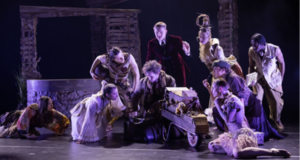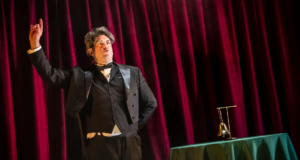Both silly and serious, Hakawatis brings us a fresh and sensual look at the women of the One Thousand and One Nights.Summary
Rating
Excellent
The title, Hakawatis, translates as ‘storytellers’, and in this production, the audience are privy to tales told between wives-to-be and passed on to the brutal ruler Shahryar in the hopes of evading his wrath, creating a meta situation of storytelling about storytelling. Thematically, it is a highly compelling show: we see sex represented as a tool of both pleasure and oppression, and women who are both vulnerable and empowered for the same reasons.
The staging in the wonderful Sam Wanamaker Playhouse is beautiful and intimate: a cosy candle-lit scene of pillows and blankets. We open with the young Fatah (Alaa Habib) arriving dressed like a princess and awaiting her fairytale marriage. Here she meets Akila the Writer (Nadi Kemp-Sayfi), Zuya the Warrior (Laura Hanna), Wadiha the Dancer (Houda Echouafni), and Naha the Wise (Roann Hassani McCloskey). The storyteller Scheherazade, a wife the king has thus far spared, seeks to woo him through narrative and thus save all their lives. These are Fatah’s more knowledgeable peers, united by circumstances, however the production maintains the individuality of each character. The women teach Fatah to be ready for her wedding night, not only in terms of her bedroom debut, but because the tyrant king will kill her soon after. Although these women are trapped, the environment paradoxically creates a space of sexual liberation and literary fantasy.
This cast is a highly-talented ensemble of women, who seamlessly switch between love, lust, and loathing. The use of hand-held candle lanterns both to light the Playhouse and to illuminate the narrator of any given story creates a magical touch. Throughout the show they effortlessly multi-role in each new fable, and make wonderful use of physical comedy to bring these scenes to life. The audience is treated to Houda Echouafni’s dancing skills and Laura Hanna leading an impressive vocal performance, as well as the visual delights of decorative costumes. There is brilliant humour and creativity to be found: flatbreads as blankets, shoes as donkey’s ears, and sexually provocative demons donned in floaty cloths. The show balances cheekiness and laughter with the gravity of a life-or-death situation, and the cast expertly tackles this shift in moods.
The central tensions of Hakawatis are whether storytelling will save these women, and the development of their own strained friendships. In their various parables we hear that sisterhood is non-existent and that pride gets the best in all of us – a pessimistic outlook. The journey ofthe playis therefore towards salvation by Scheherazade, and the will of the women to save each other, including turning back for Scheherazade once she has secured freedom. Given that the story unfolds within captivity, the sense of progression is limited, however there is ultimately satisfying resolution and a feeling of having learnt a moral lesson.
Hakawatis is filled with delight yet grapples with complex themes of oppression and solidarity. This is a dazzling celebration of oral tradition – and yes, that is a pun! It is particularly special to see strongly individualised female characters who rejoice in their sexuality, especially in the subjugated position of unwilling wives-to-be. The Sam Wanamaker Playhouse is a stunning venue made only more gorgeous as the scene of The Arabian Nights; the sounds and visuals of this production are truly mesmerising. The cast are a hilarious and charming collection of actresses, evoking everything from lust, to peril, to jubilation in these two hours. It’s a wonderful show to bring light to a cold winter’s eve.
Writen by: Hannah Khalil
Composer, Musical Director and Oud: Kareem Samara
Designer: Rosa Maggiora
Director: Pooja Ghai
Movement Director & Intimacy Director: Jess Tucker Boyd
Hakawatis: Women of the Arabian Nights plays at Shakespeare’s Globe until 14 January. Further information and bookings can be found here.
 Everything Theatre Reviews, interviews and news for theatre lovers, London and beyond
Everything Theatre Reviews, interviews and news for theatre lovers, London and beyond



